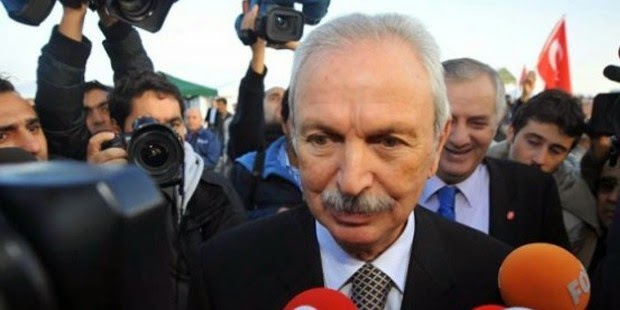Wednesday, June 10, 2009
The other day, the Turkish newspaper Taraf ran a story about the efforts of Mesut Elfeti to justice the people responsible for his father's death. The body of Elfeti's father, Abdullah Elfeti, was found two months after he was detained by the local gendarmerie in March of 1995.
Elfeti's death is one of twenty-five killings for which Colonel Cemal Temizöz, commander of the gendarmerie for the district of Kayseri, is being questioned. Temizöz is currently being held in a military detention facility.
The killings--all of which occurred in the southeast of Turkey, where Temizöz was then stationed--are thought to have taken place within the context of a pattern of illegal behavior undertaken by Turkish military and security forces. Nobody knows for sure how many unsolved mystery killings could be traced back to state authorities, but estimates range in the tens of thousands. Recently, Ahmet Türk--leader of the Democratic Society Party (DTP), a party associated with issues pertaining to Kurdish rights--said there were 17 thousand such cases in Turkey.
The ostensible rationale behind the emergence of state-sponsored death squads in Turkey was the Turkish government's battle against the PKK in the 1980s and 1990s. At the same time, however, it also seems likely that much of this activity amounted to free-lancing on the part of local authorities, who were allowed to shake down businessmen for personal profit without having to fear that they would be held accountable for their actions.
When I was living in Istanbul in the 1990s, the Susurluk scandal briefly opened a window onto these activities. Susurluk is the name of a town in western Turkey where a car accident in November of 1996 revealed that a member of parliament, Sedat Bucak (who survived the crash), had been riding with a wanted assassin named Abdullah Çatli (who died in the accident). In the car were also a number of government-issued weapons, silencers, thousands of dollars in cash, and numerous green (privileged) passports issued to Çatli in a variety of aliases--all of them signed by Mehmet Ağar, who was then Turkey's Interior minister. (Here is something I wrote on Susurluk back in the 90s, and here is a more recent discussion in the context of the Ergenekon trial).
The investigation into the "deep state" (derin devlet, the term employed by people in Turkey in reference to state-sponsored crimes of this sort) eventually ran aground when parliament refused to lift the parliamentary immunity of Bucak and Ağar. Before long, political instability and the emergence of a government dominated by the Refah Party of Necmettin Erbakan turned people's attention away from the scandal, as did the Turkish military's intervention into politics and the establishment of what became known as the "February 28 process" in Turkey.
The window onto the deep state was again briefly opened two years ago, when government raids on a house in the Umraniye district of Istanbul appeared to produce a list of assassination targets--in many cases, Kurdish businessmen and politicians. Turkish Prime Minister Tayyip Erdoğan, who in the following months would be targeted by government prosecutors in an effort to close Erdoğan's AK Party, gave an interview with Hakan Çelik of the newspaper Posta, in which he hinted at the significance of the Ümraniye findings as part of a larger effort to defeat the deep state. "Look and see where the Ümraniye events lead to. Whose names will emerge from them? These things are very interesting. Who did the bombs which were discovered belong to?"
As I've written about in numerous posts on this blog, the Ergenekon investigation--which is what emerged from the Umraniye raid--has taken a strange path indeed. What began as an investigation into the state's role in extra-legal killings has been turned into a search for coup plotters allegedly seeking to overthrow Erdogan's AK Party government. Mustafa Balbay, the Ankara bureau chief for the opposition newspaper Cumhuriyet, has been in prison since March 5 of this year, joining the ranks of dozens of academicians, journalists, and civil society figures who have likewise been implicated, detained, and imprisoned. Meanwhile, seemingly obvious candidates for police questioning into deep state matters (like Sedat Bucak of Susurluk fame) remain free.
When you look at Turkish newspapers these days, there's a truly sad tendency to tell only one part of this story. Taraf does a great job of relating stories like that relating to Elfeti, but for whatever reason is strangely uncritical of the overall direction that the Ergenekon trial has been taking. To read the pages of Taraf (which, as I've discussed elsewhere, is an influential news source for foreigners who write on Turkey professionally), one would never get the impression that the focus of the Ergenekon investigation has changed dramatically over the past eighteen months, or that the timing of this shift coincided with the beginning of the AK Party's struggle for survival against closure.
Meanwhile, opposition newspapers like Cumhuriyet and the various Doğan Group papers (including Hürriyet and Radikal, whose owner has recently been the target of a major tax investigation) write frequently on the dubious direction of the Ergenekon investigation but relatively little about the horrible and intolerable crimes which prompted popular desire for an uncovering of the deep state to begin with. Opposition leader Deniz Baykal of the Republican People's Party (CHP) has denounced the Ergenekon investigation as "a political trial, not a legal one."
Amid the politicization of Ergenekon and fears that the government has been abusing this investigation to go after its political rivals, the crimes that are allegedly connected to the state may end up getting lost in the shuffle.
|


No comments:
Post a Comment